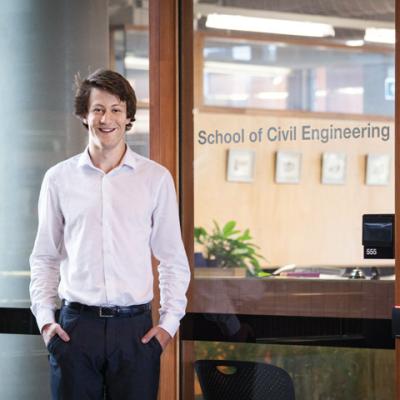
Bachelors of Engineering (Honours) / Commerce
Overview
Develop exceptional financial acumen and engineering prowess by combining a Bachelor of Engineering (Honours) program with studies in commerce.
Complete this dual program and you'll gain an extra professionally recognised qualification and a highly valued skill set that will place you in high demand with employers.
In the Bachelor of Engineering (Honours) you’ll develop technical skills through a core specialisation, which will form the basis of your career. Choose from chemical engineering, civil engineering, electrical engineering, mechanical engineering, mechatronic engineering or software engineering.
Depending on your choice of specialisation, the skills you'll develop under the engineering component of the program will allow you to work in a range of fields, from infrastructure and hospitals to energy and software.
During your commerce studies you'll complete a range of compulsory courses that cover concepts relevant across the financial services sector, including topics such as accounting, information systems, economics, business law and management. You'll graduate with a combination of core and specialist knowledge, and the skills to apply what you've learned wherever your career takes you.
Program highlights
- Be in demand from employers and add value to their business by combining commerce expertise with engineering know-how.
- Join the university with the largest range of engineering disciplines in the state.
- Develop a combination of core commerce skills, specialist knowledge, and critical evaluation and problem-solving abilities.
Majors
Tailor your studies to suit your goals. This program offers these options:
- Accounting
- Business Analytics
- Business Information Systems
- Chemical Engineering
How you'll learn
Your learning experiences are designed to best suit the learning outcomes of the courses you choose.
- Lectures
- Tutorials
- Overseas study
- Laboratory work
- Fieldwork
- Workshops
What you'll study
At UQ, degrees are called 'programs' and subjects are called 'courses'.
Career possibilities
Our programs prepare you for your first job and beyond. Depending on which major you choose, here are some of the careers you could be on your way to:
- Finance manager
- Data analyst
- Chemical engineer
- Electrical engineer
- Mechanical engineer
- Mining engineer
- Corporate financial adviser
- Software engineer
Graduate salary
Business and management (undergraduate)
compared.edu.au
Graduate salary
Engineering (undergraduate)
compared.edu.au
Program accreditation
The Bachelors of Engineering (Honours) / Commerce is accredited by:
- Engineers Australia
Events
See all events
29 June
Queensland Biology Winter School, Year 12

1 July
International Baccalaureate Research Skills Program
Stories
See all stories
Uni life
What's it really like to study commerce at UQ?
5-minute read

Careers
What jobs can you get with a commerce degree?
4-minute read

Uni life
What's it really like to study engineering at UQ?
6-minute read
Stories
See all stories
Uni life
What's it really like to study commerce at UQ?
5-minute read

Careers
What jobs can you get with a commerce degree?
4-minute read

Uni life
What's it really like to study engineering at UQ?
6-minute read
Entry requirements
Prerequisites
Studying Specialist Mathematics (Units 3 & 4, C) and both Chemistry and Physics is recommended as students will have increased flexibility in their studies.
Students without Specialist Mathematics and/or another high school prerequisite may be required to undertake preparatory courses beyond the 88 units for the program and may not be able to complete the program in the minimum time frame without overloading or undertaking summer study. View the equivalent qualifications for international students.
Prerequisites
Studying Specialist Mathematics (Units 3 & 4, C) and both Chemistry and Physics is recommended as students will have increased flexibility in their studies.
Students without Specialist Mathematics and/or another high school prerequisite may be required to undertake preparatory courses beyond the 88 units for the program and may not be able to complete the program in the minimum time frame without overloading or undertaking summer study. View the equivalent qualifications for international students.
Entry score threshold
| ATAR / Rank | IB |
|---|---|
| 84 | 32 |
These are the lowest adjusted scores we made an offer to in Semester 1, 2025. Entry scores are based on the most recent Semester 1 intake and are updated in April each year. Meeting the entry score threshold doesn't guarantee admission.
Guarantee your place at UQ: If you meet our guaranteed minimum ATAR you could secure an offer for your preferred program.
English language requirements
IELTS overall 6.5; reading 6; writing 6; speaking 6; listening 6. For other English Language Proficiency Tests and Scores approved for UQ
TOEFL iBT (including Paper Edition) - Overall 87, listening 19, reading 19, writing 21 and speaking 19.
PTE Academic - Overall Score of 64 and 60 in all sub bands.
BE - A minimum overall grade of 4 plus a minimum grade of C in all macro skills.
CES - Overall 176 and 169 in all sub bands.
OET is not accepted.
There are other ways to meet the English language requirements. For some programs, additional conditions apply.
Inherent requirements
To complete this degree, you have to meet its inherent requirements by demonstrating essential skills and attributes. Read the inherent requirements before you apply.
Student visas
International students who are accepted into full-time study in the Bachelors of Engineering (Honours) / Commerce are eligible to apply for an Australian student visa (subclass 500).
There are a number of requirements you must satisfy before a visa is granted, including the Genuine Student (GS) requirement.
Entry score range
This table shows the range of entry scores for recent secondary students offered a place in the B Engineering(Hons)/BCommerce for Semester 1, 2025
| Without adjustments | With adjustments | |
|---|---|---|
| Highest | 99.95 | 99.95 |
| Median | 95.35 | 96.5 |
| Lowest | 84.45 | 84.8 |
Who you'll study with
Here's a snapshot of our student intake for this program in Semester 1, 2025:
| Applicant background | Number of students | Percentage of all students |
|---|---|---|
(A) Higher education study | N/P | N/P |
(B) Vocational Education and Training (VET) study | <5 | <5 |
(C) Work and life experience | 0 | 0% |
| (D) Recent secondary education | ||
| 76 | 90.5% |
| 0 | 0% |
| 0 | 0% |
International students | 0 | 0% |
Total | 84 | 100% |
"<5" — The number of students is less than 5.
N/A — Students not accepted in this category.
N/P — Not published. The number is hidden to protect the privacy of students in other cells.
Need help meeting the entry requirements?
Majors
Specialisations
Tailor your studies to suit your goals. This program offers these options:
Majors
Tailor your studies to suit your goals. This program offers these options:
Specialisations
Tailor your studies to suit your goals. This program offers these options:
Majors
Tailor your studies to suit your goals. This program offers these options:
Fees and Scholarships
Indicative annual fee
Approximate yearly cost of tuition (16 units). Your fees will vary according to your selected courses and study load. Fees are reviewed each year and may increase.
$9,475
2026
Approximate yearly cost of tuition (16 units). Your fees will vary according to your study load. Fees are reviewed each year and may increase.
AUD $58,056
2026
Government assistance
Financial aid
As an international student, you might be eligible for financial aid – either from your home country, or from the Australian Government.
HECS-HELP
Domestic places in the Bachelors of Engineering (Honours) / Commerce are Commonwealth supported, as long as you meet all Commonwealth supported place eligibility requirements.
This means the cost of your education is shared between you and the Australian Government. Instead of tuition fees, Commonwealth supported students pay what are called student contribution amounts.
If you have a Commonwealth supported place, you may also be eligible for HECS-HELP. This is an Australian Government loan scheme to assist eligible students with the cost of their student contribution amounts.
Centrelink support
The Australian Government offers a number of income-support payments to eligible Australian university students.
Scholarships
You may be eligible for more than 100 scholarships, including:
How to apply
Applying online
If your senior schooling is from outside Australia, you can submit your application to UQ. Or, if you prefer, you can use an approved UQ agent near you.
The program code for the Bachelors of Engineering (Honours) / Commerce is 2488.
How to apply for undergraduate study
If your senior schooling is from Australia
Submit your application to the Queensland Tertiary Admissions Centre if you're an international student who is currently studying:
- Australian Year 12 (in Australia or another country), or
- the International Baccalaureate in Australia.
The QTAC code for the Bachelors of Engineering (Honours) / Commerce is 717201.
Applying through QTAC
All domestic applications should be submitted to the Queensland Tertiary Admissions Centre (QTAC).
The QTAC code for the Bachelors of Engineering (Honours) / Commerce is 717201.
Important dates
If you’re studying Year 12 in Australia, go to the QTAC website to check the closing date for this program.
If you’re applying to UQ, the closing date for this program is:
- To commence study in semester 2 - May 31 of the year of commencement.
- To commence study in semester 1 - November 30 of the previous year.
Visa processing times vary. Apply and accept your offer as early as you can.
To learn more about UQ dates, including semester start dates, view the Academic Calendar.
Important dates
To check the closing date for this program, go to the QTAC website.
To learn more about UQ dates, including semester start dates, view the Academic Calendar.
Admissions schemes
Applying to university can be both exciting and daunting, which is why we’ve tried to make the process as simple as we can.
We have several schemes in place to improve your chances of getting a place at UQ.
Pathway options
A rank or score doesn’t determine your potential.
If you're not offered a place in your first-choice program – or if you don't meet the entry requirements – you still have a number of options.
Aboriginal and Torres Strait Islander applicants
For support with applying – or if you have any questions about university life – get in touch with our Aboriginal and Torres Strait Islander Studies (ATSIS) Unit.
Explore other programs
Express yourself. And your interest.
They say choosing a degree is hard, which is why we've made it easy. Register your interest and we'll send you everything you need to know about applying to UQ.






